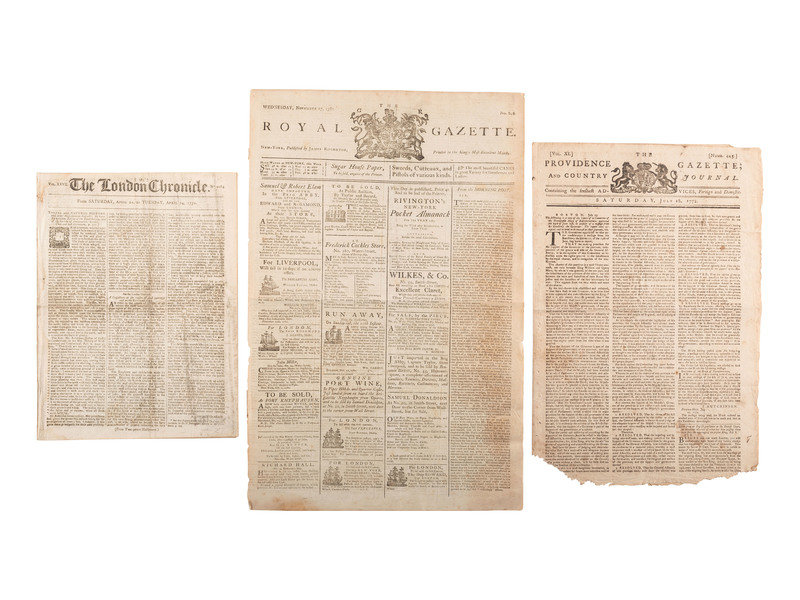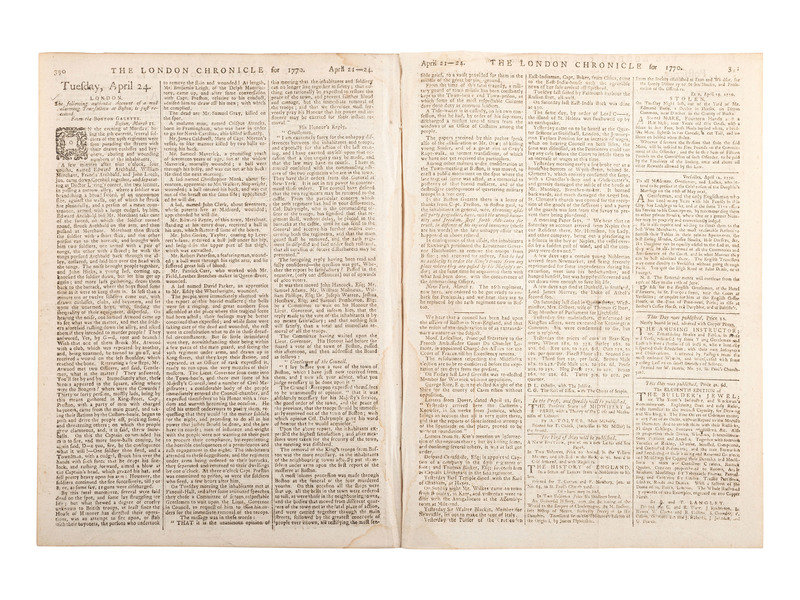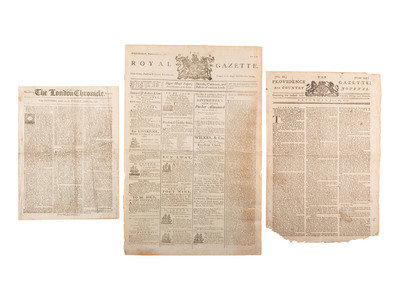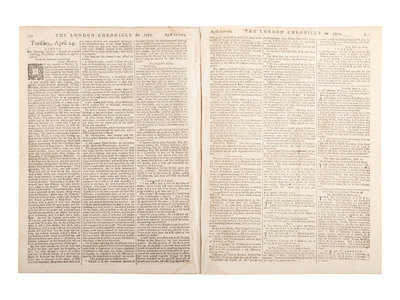Lot 709
[REVOLUTIONARY WAR]. A group of 3 newspapers reporting on events involving the American Revolution, incl. the first news of the Boston Massacre.
Sale 1096 - American Historical Ephemera & Photography
Lots Open
Nov 11, 2022
Lots Close
Nov 21, 2022
Timed Online / Cincinnati
Own a similar item?
Estimate
$300 -
600
Price Realized
$469
Sold prices are inclusive of Buyer’s Premium
Lot Description
[REVOLUTIONARY WAR]. A group of 3 newspapers reporting on events involving the American Revolution, incl. the first news of the Boston Massacre.
The London Chronicle. Vol. XXVII, No. 2084. London [England]: Sold by J. Wilkie, 24 April 1770. 8pp, quarto (disbound, light soil, creasing at folds).
Detailed account with the first news of the Boston Massacre, offering "The following authentic Account of a most alarming Transction at Boston, is just reecived. / From the Boston Gazette. Boston March 12. On the evening of Monday… Several soldiers of the 29th regiment were seen parading the streets with tehir drawn cutlasses and bayonets, abusing and wounding numbers of the inhabitants..." Confrontation between soldiers and youths erupted “… In less than a minute 10 or 12 soldiers came out, with drawn cutlasses, clubs and bayonets and set upon the unarmed boys…Captain Preston with a party of men with charged bayonets, came from the main guard and taking their stations by the Custom House began to push and drive people off...the people grew clamorous, and it is said, threw sno-balls. On this the Captain commanded his men to fire, and more snoballs coming, he said d--n you, fire, be the consequence what it will!" The article continues to describes the carnage and list the dead including “A Mulatto man, named Crispus Attucks, born in Framingham, who was here in order to gor for North Carolina, also killed instantly." Citizens meet in Faneuil Hall: “The people are immediately alarmed with a report of this horrid massacre; the bells set a ringing, and great numbers soon assembled at the place where this tragical scene had been acted…and while some were taking care of the dead and wounded, the rest were in consultation with to do in those dreadful circumstances….” The Lt. Governor promised “to do all in his power the justice should be done…. The inhabitants attended to these suggestions, and the Regiment under arms being ordered to their barracks, they separated and returned to their dwellings by 1 o'clock. At 3 o'clock Capt. Preston was committed to prison, as were soldiers who fired…” Detailed account, more than one full page. Tax stamp at bottom of page 2.
[With:] Providence Gazette; and Country Journal. Vol. XI, No. 445. Providence [RI]: John Carter, 18 July 1772. 4pp, approx. 10 1/4 x 15 in. (loss at bottom left corner affecting text, creasing, scattered spotting).
Entire front page devoted to the report of the committee of the House of Representatives of the Province of Massachusetts Bay on the right of the assembly to raise revenue. The committee concludes its address to the Governor with a number of resolutions which are printed along with the response from Governor Thomas Hutchinson who requests a written account of “… the proceedings of House of Representatives, especially in matters of this nature. I must desire you to direct that I be furnished with an attested copy of such votes or resolves from your journals… “ Additional news included a report from Boston July 13: “His Excellency's company of cadets, in their uniforms, commanded by Colonel Hancock, paraded in King Street and marched to the common, where they went through the various military exercises and evolutions, to the pleasure and satisfaction of a great number of spectators… An elegant entertainment was given to the company at the Bunch of Grapes Tavern by their Colonel….” Much news from other colonies and numerous ads seeking the return of freedom seekers. Masthead features the royal coat of arms.
Entire front page devoted to the report of the committee of the House of Representatives of the Province of Massachusetts Bay on the right of the assembly to raise revenue. The committee concludes its address to the Governor with a number of resolutions which are printed along with the response from Governor Thomas Hutchinson who requests a written account of “… the proceedings of House of Representatives, especially in matters of this nature. I must desire you to direct that I be furnished with an attested copy of such votes or resolves from your journals… “ Additional news included a report from Boston July 13: “His Excellency's company of cadets, in their uniforms, commanded by Colonel Hancock, paraded in King Street and marched to the common, where they went through the various military exercises and evolutions, to the pleasure and satisfaction of a great number of spectators… An elegant entertainment was given to the company at the Bunch of Grapes Tavern by their Colonel….” Much news from other colonies and numerous ads seeking the return of freedom seekers. Masthead features the royal coat of arms.
[Also with:] The Royal Gazette. No. 644. New York: James Rivington, 27 November 1782. 4pp, approx. 11 3/4 x 18 1/4 in. (disbound, toning, small tears at folds).
Ppublished by James Rivington, printer to the King's Most Excellent Majesty, New York." With news of the arrival of Governor William Franklin to London and references to negotiations to end the conflict in America. Detailed criticism of speeches by Charles James Fox in Parliament suggesting that Britain should grant America unconditional and immediate independence. Many advertisements including ships sailing for London and Liverpool. Illustrated ads for the return of freedom seekers.
JAMES RIVINGTON (1724-1802) came to the colonies in 1760 and settled in New York. He began the publication of Rivington's New York Gazeteer (Rivington's New-York Gazetteer; or The Connecticut, New-Jersey, Hudson's-River, and Quebec Weekly Advertiser) in 1773. His neutralist and increasingly loyalist views irritated the Sons of Liberty. In 1775, immediately after the opening of hostilities, Rivington's shop was burned and looted by the Sons of Liberty. Another mob that day burned Rivington's house to the ground. Rivington and his family sailed for England, where he was appointed King's Printer for New York, at £100 per year. In 1777, after the British occupation of New York, he returned with a new press and resumed the publication of his paper under the title of Rivington's New York Loyal Gazette, which he changed on 13 December 1777, to The Royal Gazette, with the legend "Printer to the King's Most Excellent Majesty." The Royal Gazette ceased publication in 1783 with the withdrawal of British troops. He was allowed to continue to live in New York, allegedly because he had furnished General George Washington with important information during the War.
Ppublished by James Rivington, printer to the King's Most Excellent Majesty, New York." With news of the arrival of Governor William Franklin to London and references to negotiations to end the conflict in America. Detailed criticism of speeches by Charles James Fox in Parliament suggesting that Britain should grant America unconditional and immediate independence. Many advertisements including ships sailing for London and Liverpool. Illustrated ads for the return of freedom seekers.
JAMES RIVINGTON (1724-1802) came to the colonies in 1760 and settled in New York. He began the publication of Rivington's New York Gazeteer (Rivington's New-York Gazetteer; or The Connecticut, New-Jersey, Hudson's-River, and Quebec Weekly Advertiser) in 1773. His neutralist and increasingly loyalist views irritated the Sons of Liberty. In 1775, immediately after the opening of hostilities, Rivington's shop was burned and looted by the Sons of Liberty. Another mob that day burned Rivington's house to the ground. Rivington and his family sailed for England, where he was appointed King's Printer for New York, at £100 per year. In 1777, after the British occupation of New York, he returned with a new press and resumed the publication of his paper under the title of Rivington's New York Loyal Gazette, which he changed on 13 December 1777, to The Royal Gazette, with the legend "Printer to the King's Most Excellent Majesty." The Royal Gazette ceased publication in 1783 with the withdrawal of British troops. He was allowed to continue to live in New York, allegedly because he had furnished General George Washington with important information during the War.
This lot is located in Cincinnati.
Property of William H. Itoh, collector, historian and retired Foreign Service Officer
Condition Report
Contact Information



